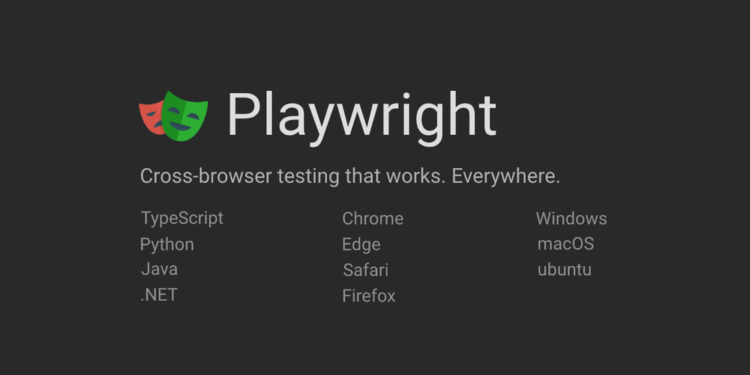Playwright, a versatile cross-browser framework, empowers you to conduct end-to-end automated testing of web applications effortlessly. With its unified API, Playwright enables seamless testing across different browsers, ensuring consistent and reliable results. By running frequent tests, Playwright guarantees that your web application operates smoothly and meets your expectations.
To facilitate effective web development testing, Playwright goes beyond traditional approaches. It simulates real-world user interactions, providing a comprehensive perspective and enabling you to assess your application’s performance from the user’s point of view. This user-centric approach ensures that your web development is thoroughly examined and optimized for a seamless user experience.
What is Playwright?
Playwright is a robust test automation library that originated as an open-source project developed by contributors from Microsoft. It offers comprehensive support for multiple programming languages, including Java, Python, C#, and NodeJS. With an Apache 2.0 License, Playwright provides flexibility and accessibility to developers.
Among the various programming languages, Playwright is particularly popular within the NodeJS community, utilizing JavaScript/TypeScript. This Playwright tutorial focuses on assisting you in setting up NodeJS using Visual Studio Code, an integrated development environment (IDE) known for its efficiency and user-friendly interface.
Why Opt for Playwright Automation?
Playwright automation offers a multitude of compelling reasons to choose it as your preferred testing framework. Despite being relatively new to the market, Playwright boasts impressive capabilities and wide-ranging language support. Whether you are transitioning from Selenium or exploring new automation options, Playwright’s compatibility with C#, Java, and Python ensures a seamless migration without language constraints. Since its initial release in January 2020, Playwright has rapidly gained popularity within the testing community.
One of the standout features of Playwright is its utilization of the DevTools protocol. This enables the creation of robust and stable automated tests. By directly interacting with and controlling the browser, Playwright bypasses the need for intermediary translation layers. This direct browser control allows for the simulation of more comprehensive and relevant user scenarios, providing deeper insights into the behavior of your web applications.
With Playwright automation, you can harness the power of the DevTools protocol, unlock enhanced testing capabilities, and conduct insightful and reliable automated tests. Stay at the forefront of testing technology by choosing Playwright as your automation framework of choice.
Keynote Features of Playwright
Playwright is equipped with a comprehensive set of features designed to support software developers and QA specialists in their daily work. Here are the core features that make Playwright a powerful tool for creating and executing automated tests:
- Cross-platform testing: Playwright seamlessly operates across multiple platforms, including macOS, Linux, and Windows, enabling consistent testing experiences without the need for platform-specific code modifications.
- Cross-browser testing: With Playwright, you can automate tests across various browsers, including MS Edge (with Chromium), Mozilla Firefox, and Apple Safari (with WebKit), ensuring your application functions flawlessly across different browser environments.
- Element selection: Playwright provides a user-friendly API for selecting and interacting with elements on web pages. This simplifies the testing of specific components or sections of your application and enables effective test isolation.
- Automated browser context management: Playwright automates browser context management, making it effortless to launch, close, and switch between multiple tabs within a single test. This streamlines testing scenarios involving multiple tabs or windows and simplifies the setup and management of your testing environment.
- Visual testing: Playwright offers a visual regression testing API that allows you to compare snapshots of pages across different browsers, enabling quick detection of visual changes introduced during development. You can test entire page views or specific elements, and the test report displays visual comparisons of expected and actual images, facilitating easy identification of discrepancies.
- Real-time interaction: Playwright provides a rich API for automating real-time user interactions such as clicking, typing, scrolling, and mouse movements. This feature allows you to thoroughly test user interactions and validate system behavior.
- API testing: Playwright facilitates the testing of modern web applications by enabling users to send HTTP requests to endpoints and validate responses. It supports testing RESTful and GraphQL APIs, and can handle authentication and authorization requirements.
- Network and performance testing: Playwright offers a robust network interception API for testing network requests and performance metrics, such as time to first byte and time to interact. It also simulates various network conditions to evaluate application performance and identify areas for improvement.
- Code generation: Playwright includes a built-in code generation capability that generates test code based on user interactions with web pages. This feature simplifies test creation and reduces the time required to write tests, making it especially useful for non-technical users. However, it is important to have an understanding of the test’s purpose and the framework’s operations.
- Inspector and trace viewer: Playwright provides an inspector tool for interacting with elements and debugging tests by inspecting and modifying page state. Additionally, the trace viewer allows users to visualize and analyze step-by-step activity during test runs, providing insights into network requests, events, and page interactions.
- Mobile testing: Playwright enables full test execution for mobile applications in browsers by emulating real mobile devices. Users can customize screen sizes, viewports, geolocation, locale, timezone, and permissions to accurately test mobile applications.
- Multi-language support: Playwright supports multiple programming languages, including JavaScript, TypeScript, Python, Java, and C#, catering to diverse developer preferences and existing codebases.
- Easy configuration in one file: Playwright offers a flexible configuration approach, allowing users to customize their testing environment and settings, such as browsers, viewports, timeouts, retries, artifacts, and more, all within a single, organized location. This simplifies test configuration and improves efficiency.
- Friendly test reporter: After each test run, Playwright provides a user-friendly HTML report with all the essential information about the test run result. By using the “npx Playwright show-report” command, you can easily open and view the detailed test report.
Benefits
- Enhanced Testing Efficiency: Playwright simplifies test writing with its intuitive syntax and allows running tests simultaneously in multiple browsers. This saves time and effort during web application testing. It excels at automating complex scenarios involving multiple domains, pages, and frames, making it ideal for comprehensive test coverage. Playwright’s network control capabilities enable stubbing and mocking of network requests, enhancing testing flexibility.
- Improved Test Reliability: Playwright executes tests using actual browser engines, ensuring more reliable results compared to simulated browser environments. Auto-wait APIs in Playwright wait for elements to be ready before interacting with them, improving test reliability and ease of test creation. Timeout-free automation eliminates the need for sleep timeouts, reducing test flakiness. Reusing browser instances with browser contexts enables lean parallelization and efficient resource utilization.
- User-Friendly and Easy to Learn: Playwright provides a simple API that is beginner-friendly, even for developers new to automated testing. It offers comprehensive documentation and examples, facilitating quick adoption and proficiency.
- Automatic Waiting: Playwright incorporates automatic waiting functionality, ensuring smooth and consistent test execution even when page loading takes longer than expected. It performs checks on elements to ensure their readiness before interacting with them, enhancing test reliability.
- Debugging Tools: Playwright includes debugging tools such as logging packages, compatibility with Node.js debuggers and browser developer tools. It enables debugging in both headless and headful modes, facilitating effective troubleshooting and issue resolution.
- Strong Community Support: Playwright benefits from an active and supportive community of contributors and users. This vibrant community ensures accessible resources and assistance for addressing any issues or challenges encountered while using the framework.
- Easy Workflow Integration: Playwright seamlessly integrates into existing workflows and is easily installable with a single line of code. It provides built-in TypeScript support, editor debugger compatibility, and works well with various continuous integration and continuous delivery (CI/CD) providers.
- Automating Authentication Scenarios: Playwright enables automation of scenarios involving authentication. It leverages browser contexts to execute tests in isolated environments, improving reproducibility and preventing cascading test failures. Playwright facilitates automated login processes and allows reuse of authentication states, streamlining test execution. It is suitable for testing cookie or token-based authentication scenarios.
- Emulation: Playwright offers features for overriding device parameters, enabling emulation of different device configurations and environments. It allows customization of viewport size, device scale factor, touch support, locale, timezone, and color scheme. Playwright also provides control over geolocation, user agent, permissions, color scheme, and media settings, facilitating thorough testing of web applications under various conditions.
In the landscape of web automation tools, the comparison between Playwright and Selenium is paramount. While Selenium has long been a staple choice for automated testing, Playwright presents a modernized alternative, boasting native browser automation capabilities and enhanced stability. This shift from Selenium to Playwright marks a pivotal evolution in testing frameworks, offering developers a more efficient and reliable solution. With Playwright’s unified API and direct browser control, the debate of ‘playwright vs selenium‘ becomes a central consideration for teams navigating the realm of automated testing.
Limitations
Playwright, being a rapidly evolving testing framework, is continuously improved to address its limitations and provide users with an enhanced testing experience. However, it’s important to acknowledge certain limitations that exist in the current state:
- Community support: As a relatively new framework, Playwright may have a smaller community compared to more established testing tools. This might result in fewer community resources, discussions, and plugins available for users. However, the framework’s popularity is growing, and community support is expected to expand over time.
- Native mobile app testing: Playwright currently does not natively support testing of native mobile applications. This limitation means that exclusive testing of mobile apps may require alternative tools or workarounds alongside Playwright.
- Internet Explorer 11 support: Playwright does not provide native support for Internet Explorer 11, which may pose a challenge for organizations that heavily rely on this browser for testing. However, integrating Playwright with cloud-based digital experience testing platforms like LambdaTest can enable compatibility with Internet Explorer 11 and other browser versions.
- Reliance on official documentation: Due to the evolving nature of Playwright and the relatively smaller community, users may rely more on official documentation and resources provided by the Playwright team. While these resources offer accurate and up-to-date information, they may not provide the same breadth of perspectives and experiences as a larger community would.
It’s important to note that Playwright’s development team actively addresses these limitations and continues to enhance the framework. As the framework gains more popularity and community support expands, these limitations are likely to be mitigated, making Playwright an even more robust and versatile testing solution.
LambdaTest is a cloud-based platform specifically designed for testing digital experiences across multiple browsers. It provides a wide range of browser versions, including older ones like Internet Explorer, catering to the testing requirements of Playwright scripts.
The cloud-based automation testing infrastructure of LambdaTest allows for rapid and effortless scalability of testing capabilities. This scalability is particularly beneficial when testing complex and extensive applications. By integrating LambdaTest with Playwright, users can leverage the unique strengths of both platforms, resulting in more thorough and reliable testing outcomes.
Also, Read Best Practices for Writing Reliable and Maintainable Selenium-Mocha Tests.


















